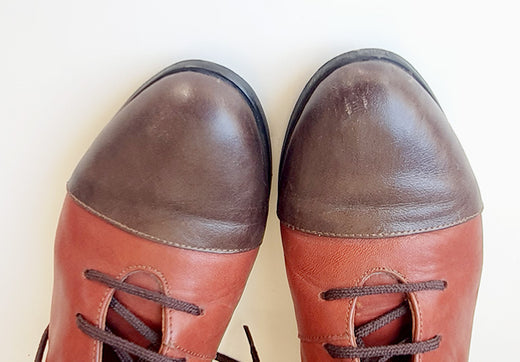Leather shoes are known for their long-lasting and luxurious qualities. They may be more expensive then synthetic shoes, but this is because they are more durable and will last much longer in comparison.
In saying that, leather shoes are prone to wrinkling, scratching and scuffing from regular wear (the only way to avoid this would be to not wear them at all!). Because of the resilient quality of leather, these can be easily treated.
Below are a few tips on how to deal with surface scuffs and scratches. Deeper scratches can initially be treated in the same way for a quick fix, but will probably need additional fixes or require your shoes to be refinished by a professional. A professional can guide you on how to renew leather shoes, or even on how to repair old leather shoes and have you wearing them again!

For surface maintenance:
-
Clean Your Shoes
It is very important to begin by knowing what type of leather you are dealing with and then give your shoes a good cleaning. For treated leather, you can clean the leather using a damp cloth, and for untreated leather shoes it is better to a soft brush to dust off any dirt and then wipe them with a dry cloth (alternatively you can also use oil soap or saddle soap). It is a good idea to stuff your shoes with newspaper to maintain the shape.
-
Use Petroleum Jelly
Use a clean cloth to rub petroleum jelly on the leather in a circular motion (it is important to use a jelly that is not colored or scented). Wait 10 minutes then wipe any excess off with a clean cloth. The jelly would have filled in the scratch so it is less or not visible at all. Using a filler repair compound, like the Tarrago Filling Paste, is also a great idea (paid link) -
Use White Vinegar
Use a clean cloth or cotton ball to dab white vinegar on the scratched area of the shoes. This will swell the leather and alter scratch so it is less or not visible at all. Applying a shoe polish after this is a good idea to keep your leather shoes shiny.
-
Use Olive Oil
Olive oil can be a great way to repair very shallow scratches. Use a cotton ball or paper towel to carefully dab oil onto the scratched area, then wipe any excess off with a clean cloth or paper towel.

-
Use a Leather Marker or Recoloring Balm
For a scratch that is in high contrast with the rest of your shoe, it is a good idea to use a leather marker or recoloring balm in the same in the same color of your shoe to fill in the scratch. You can apply the recoloring balm to the leather using a clean cloth or rag. I like the Triple Crown Leather Preservative & Restorer. It is very versatile and made of all natural ingredients (paid link). -
Use a Hairdryer
Heat causes leather to become more supple and flexible, and using heat from a hairdryer is a great way to fix a scratch. The heat will swell the leather and get the scratch to be less visible or even disappear. Make sure to use the medium setting on the hairdryer to warm up the leather and then massage the scratched area with your finger. It is important to make sure that the air coming out is not too hot and to avoid keeping the heat on one area for too long as this can ruin or burn the leather
Whatever method you choose to try, make sure to use small amounts of product and gradually increase as needed. This will give you more control over the effect on your shoes.

Your leather shoes can last a lifetime with a little bit of TLC, and no small scuff or scratch should discourage you from investing in a great pair! So shop the Rana Cheikha and Wander Collections to invest in a pair of handmade leather shoes in real leather.
It’s great to invest in a shoe care kit (they also make great gifts by the way!). Love both the Stone and Clark Store and the MAXIMILIAN kits that carry all the essentials and are easy to store and take on trips! (paid links)
Also use our guides that include Summer Shoes - Keeping Your Feet Happy & Healthy and Travel the World with Your Best Shoes to make sure they’re always looking great!
Signing-off: The Shoe Advisor
(As an Amazon Associate, I earn from qualifying purchases.)
// Get in touch here or by email at rana@ranacheikha.com for more insight, queries and information //





